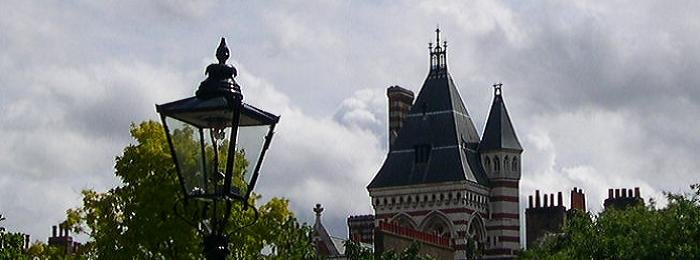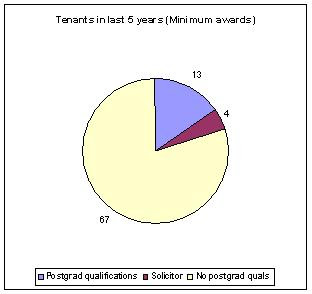If you've written for the "popular" press in the last week try this little exercise. See if you can spot the difference between this and this. Then try applying your new found knowledge to the Chindamo judgment.
Then you might like to try:
The Chindamo case
Human Rights - once more with feeling
Learco Chindamo and the law
Finally, you might be surprised to discover that it is possible to write a reasonably balanced and (shock horror!) accurate report. Try The Guardian and The Times.
This exercise is available free of charge, even if you are a lowly Secretary of State for Justice or a humble Leader of the Opposition. Not too hard was it?
Wednesday 22 August 2007
Spot the Difference
Posted by
The Chief
at
11:56
4
comments
![]()
Saturday 18 August 2007
Nu Looks
Ok, I try to keep the non-law postings brief and to an absolute minimum, so all I've got to say is that I'm in the process of messing around with the site look. Let me know if I hit upon anything you really like or really despise. I check any changes with FF, IE and mobile Opera, but do let me know if it seems to be broken in any browser/OS combination.
If you subscribed to the feed a long time ago it might be worth changing to the feedburner one, it doesn't seem to randomly claim to have a whole load of new postings all the time.
Incidentally, is it just me or are Blogger templates a total pain to try and change? Would I be better off switching to Wordpress? On the subject of templates if you use Google Analytics and then change your template, don't forget to add the tracking code back in again otherwise you end up why absolutely nobody has visited for two weeks, which is what happened to ... err ... somebody I know (puts hands in pockets, walks away whistling).
Posted by
The Chief
at
08:55
2
comments
![]()
Friday 10 August 2007
Pupillage and Postgraduate Qualifications
Slightly off topic for this august web journal, but I have been thinking quite a bit about this post on Simon Myerson's excellent blog. Simon suggests that a Masters degree is generally not much use in gaining a pupillage. Barrister-2-b has also asked whether a Masters degree can boost the chances of getting pupillage. As the last few pupils I have spoken to have all had some sort of postgraduate qualification it seemed to me that this must confer some sort of an advantage, but the opinions of those in the know was mixed.
In the spirit of statistical adventure I donned my favourite anorak and gathered information from 50 sets in the South East, mainly in London, chosen on a random basis (although it seems to be slightly skewed towards Chancery sets and away from Criminal) from the latest Chambers Student Guide, on tenants that they have taken on in the last five years. This has not been done with any degree of scientific rigour so don't be surprised if it seems like cold fusion if you try and recreate these results. I have tried to exclude the Oxford, Cambridge and Dublin 'fake' MAs, although it is possible that some have slipped through. It is equally possible that some qualifications have been under reported on the web. A few websites have not been updated for the most recent batches of tenants, so the information used is for just three or four years. What I haven't been able to do is analyse the type of postgrad qualification in too much detail as many websites don't list these, but merely describe them. So, if for instance, someone is described as having "a Masters from UCL" I can't tell if that is an LLM or an MA in Archaeology of the Eastern Mediterranean and the Middle East, so I have simply recorded it as a postgrad level qualification. The websites of the 50 sets yielded information on a total of 350 barristers. At an average of about 600 new tenants a year, this represents around 11-12% of the total number taken on during this time. Perhaps most importantly, this data is for pupils who were offered tenancy - it does not tell us anything about those who got pupillage, but weren't good (or lucky) enough to continue past a year.
Out of these 350, seven had moved over after practising as a solicitor. I have included them in the pie charts, but left them out of the percentage comparison chart at the bottom. Note how the purple (or the blackcurrant in the pie) which represents those with postgraduate qualifications increases as the value of the pupillage award offered increases and the yellow (or custard) decreases correspondingly. At Chambers offering over £20,000 for a pupillage over half of the recent tenants have a postgraduate qualification.
There is definitely a correlation of sorts in this last graph. I think the slight reversal at £45k could possibly be attributed to the relatively small sample size for that level of pupillage award.
Although as I mentioned above I have not been able to dig into the level of postgraduate qualifications in any great detail, amongst all these qualifications there are:
31 BCLs
40 LLMs
42 MAs
12 MPhils
14 PhDs
What does this mean in terms of the usefulness of a postgraduate qualification in gaining pupillage? It's difficult to be too certain as it's very possible that some of these qualifications have been gained after securing pupillage or even after securing tenancy. None the less, the more that chambers pays its pupils, the greater the likelihood that they will have an extra qualification. As an anecdotal observation, but not one that I recorded data for, it seemed to me going through the websites that at these 'top-end' chambers it was only Oxbridge graduates that were taken on without any postgraduate level qualifications. There are, of course, many non-sinister explanations for this, so I'm not going to jump to the obvious old boys network conclusion.
I'm sure this data needs far more analysis to build an accurate picture, but I hope this adds something to the debate. What I am acutely aware that it does not do, nor do I make any claim that it does, is show causation. The whole thing may also seem blindingly obvious to some, but I think pretty graphs are always good.
Update (1): See Simon Myerson's new post on this topic here.
Update (2): Simon requested a further breakdown of the courses and the institutions offering them. I have gathered information on a further 19 sets bringing us to a grand total of 500 barristers. These extra 150 reflect the general picture given above, but they also offer up a few more examples of different qualifications, so that I now have information on qualifications from 42 different institutions, as follows:
54 Oxford
40 Cambridge
14 KCL
11 Harvard
9 LSE
7 UCL
7 London
6 City
4 NYU
4 Toronto
3 Columbia
3 Pennsylvania
2 College of Europe
2 EUI, Florence
2 McGill
2 Paris
There were a further 26 institutions which only had one representative, such as Birmingham, Bristol, Chicago, Courtauld Institute, Duke Law School, Essex, Georgetown, Konstanz, Middlesex, Newcastle, Nottingham, Open, Belfast, Coventry, Sheffield, Siena, Sorbonne, Virginia, Westminster and Yale.
Among the level of qualifications that I could obtain information on are:
65 LLMs
46 MAs
41 BCLs
20 MPhils
13 PhDs
5 DPhils
5 Diplomas
3 MScs
2 MSts
1 MPP
1 MJur
Among these were the following varied specialisations:
DPhils: Public and Regulatory Law; Modern History; Ancient History; Philosophy
LLMs: Commercial and Corporate Law; Comparative, European and Public Law; Human Rights; Criminal and Public Law; EC Law; French and European Law; International Trade Law; Employment Law; Comparative European and International Legal Studies
MPhils: Medieval History; Political Thought and Intellectual History; International Relations; Historical Studies; Politics; Economics; English Literature; International Development; Philosophy; Theology
MAs: Modern History; Communication Policy Studies; International Economic and Stragetic Studies; Irish Politics; Medical Law and Ethics; 20th C Literature; Irish Politics; Law; Comparative Legal and Constitutional Theory; Arabic and Middle Eastern Studies; Crime, Human Rights and the International Community; Disability Studies; Ethics; Administrative Law; Privacy in English Law; Architectural History; Labour Law; Legal and Political Philosophy
PhDs: Development Education; International Criminal Law; Neuroscience; Urban Consumer Space; Damages and Human Rights; Philosophy; Musicology
Diplomas: EC Competition Law; EC Law; International Human Rights
Posted by
The Chief
at
12:07
4
comments
![]()
Labels: pupillage, university
Tuesday 7 August 2007
Judges - they're not all bad
Turns out that when judges aren't making up daft codes, failing to stand down and then coming over all intemperate, getting blackmailed over affairs or smuggling cigarettes and alcohol (way back in the day) they are actually doing an ok job. At least that's what the Annual Report of the Office for Judicial Complaints would have us believe. Dale Simon, Head of the OJC, has been interviewed by The Times about this.
Posted by
The Chief
at
15:26
5
comments
![]()
Labels: judiciary
Friday 3 August 2007
Stockwell II: The Return of the Cover-up
Apparently we're supposed to believe that Ian Blair was totally ignorant about the chaos and misinformation spread by the Met in the aftermath of the shooting of Jean Charles de Menezes at Stockwell station. Either someone's lying or that's a heck of a way to run a police force. Still, hands up who really thought someone would take the blame and get punished? After all it was only Jonathan Foreigner wot got shot.
The full Stockwell Two report is here, a short list of questions and answers is here (note the instructions for the subs at the top of page 2 - very professional).
Elsewhere in the blogipeligo: Geeklayer ¦ Adrian Monck
Posted by
The Chief
at
09:36
2
comments
![]()
Labels: police








